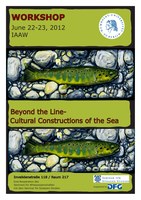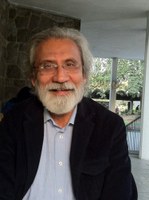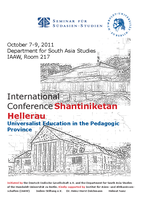News
International Workshop: Beyond the Line - Cultural Constructions of the Sea (June 22–23, 2012)
The international workshop “Beyond the Line – Cultural Constructions of the Sea” examines the relationship between land and sea. It investigates how the currently changing constellations in South-South relationships can be understood historically and culturally. If the active participation of the regions south of the Sahara since early modern times is denied, what is the situation today? And beyond that: is it justified in any way to attribute a historical insignificance to regions neighboring Africa on the Atlantic and Indian Oceans?
International Workshop: Beyond the Line - Cultural Constructions of the Sea (June 22–23, 2012)
The international workshop “Beyond the Line – Cultural Constructions of the Sea” examines the relationship between land and sea. It investigates how the currently changing constellations in South-South relationships can be understood historically and culturally. If the active participation of the regions south of the Sahara since early modern times is denied, what is the situation today? And beyond that: is it justified in any way to attribute a historical insignificance to regions neighboring Africa on the Atlantic and Indian Oceans? These questions will be analyzed in the framework of a current trend in the social and cultural sciences that is called the “oceanic turn.” The symposium aims to pursue these questions and make its own contribution to them. Participants present the Atlantic and Indian Oceans as a cultural space. Individual panel discussions examine case studies of literature, migration, piracy, and trade cultures. In this way, research results on the sub-Saharan part of Africa will be investigated in their relationship to the Atlantic and Indian Oceans and new approaches will be formulated. Conceived by Michael Mann and Ineke Phaf-Rheinberger
3rd HIP-Workshop
You are cordially invited to participate in the 3rd Humboldt India Project (HIP) Workshop which will take place on the 25th May, 2012. The workshop aims to provide a forum for exchange across institutional and disciplinary boundaries on topics related to South Asia. The 4th HIP Workshop is going to take place at the 29th of June.
3rd HIP-Workshop
You are cordially invited to participate in the 3rd Humboldt India Project (HIP) Workshop which will take place on the 25th May, 2012. The workshop aims to provide a forum for exchange across institutional and disciplinary boundaries on topics related to South Asia. The 4th HIP Workshop is going to take place at the 29th of June.
Second HIP-Workshop on 27th of January 2012
Workshop for doctoral candidates from the Humboldt-Universität zu Berlin working on South Asia.
Second HIP-Workshop on 27th of January 2012
Workshop for doctoral candidates from the Humboldt-Universität zu Berlin working on South Asia.
Im „Dritten Raum“: Lebenswelten indischer Arbeitsmigranten und -migrantinnen in der Golfregion
Vortrag von Dr. Christiane Hartnack (Donau-Universität Krems/Universität Wien)
Zur Aktualität der Teilung Britisch-Indiens im individuellen und sozialen Gedächtnis
Roundtablegespräch mit Dr. Christiane Hartnack (Donau-Universität Krems/Universität Wien)
Gastprofessor Prof. Dr. Irfan Habib
Prof. Dr. Irfan Habib (New Delhi, Indien) ist vom 23.4.-31.08. 2012 Gastprofessor am Seminar für Südasien-Studien im Rahmen des "Rotating Chair" Programms des Indian Council of Culural Relations.
Gastprofessor Prof Dr. Iftekhar Iqbal
Prof Dr. Iftekhar Iqbal (Dhaka, Bangladesh) ist vom 6. Juni 2012 - 31. Mai 2013 als Stipendiat der Humboldt-Stiftung am Seminar für Südasien-Studien.
Wissenschaftliches Kolloquium
Gender und Islam: Säkulare und religiös begründete Geschlechterdiskurse in transregional vergleichender Perspektive
Auftakttreffen des DFG-Netzewerks
Das erste Treffen des Netzwerks "Medialisierung außerhalb Europas: Südasien, Südostasien und der arabischsprachige Raum" findet am 12. und 13. November 2011 am Institut für Asien- und Afrikawissenschaften/Humboldt-Universität zu Berlin statt.
International Conference Shantiniketan Hellerau - Universalist Education in the Pedagogic Province
In the 19th century, urbanization and industrialization changed the globe dramatically and were feared by many. The universalist education movement arose as a countercultural reaction to these developments. Idealists strove to create a new world and educate the “new man.” Shantiniketan and Hellerau paradigmatically represent the urge to counteract the drastic changes the world underwent back then. Initiated by the Deutsch-Indische Gesellschaft e.V. and the Department for South Asia Studies of the Humboldt-Universität zu Berlin. Kindly supported by: Institut für Asien und Afrikawissenschaften (IAAW), Indien-Stiftung e.V., Dr. Heinz-Horst Deichmann, Helmut Nanz
Public Waste and Private Health - Informelles Recycling von Elektronikschrott in Indien
Wir initiieren das neue Format der Berliner Südasiengespräche. 2011 fragen wir nach den Gesundheitsgefahren durch informelles Recycling.
Gender & Medien – Regionalwissenschaftliche Perspektiven
Eine semesterbegleitende Veranstaltungsreihe des Querschnittsbereichs Medialität und Intermedialität in den Gesellschaften Asiens und Afrikas Gefördert aus Mitteln des Gleichstellungsfonds der Humboldt-Universität zu Berlin. In Zusammenarbeit mit der Fachschaft des IAAW
Pause the Image: An Examination of the Formal Strategies used in Harun Farocki’s Films
Vortrag von Dr. Vasanthi Dass (zurzeit DAAD-Gastwissenschaftlerin am Querschnittsbereich Medialität und Intermedialität)
Post-9/11: War on Terror and the Talibanization of Pakistan
Vorträge & Diskussion mit Prof. Dr. Mumtaz Ahmad - Präsident der International Islamic University, Islamabad und Ashraf Jehangir Qazi - UN-Botschafter a.D., Direktor des Institute of Strategic Studies, Islamabad





